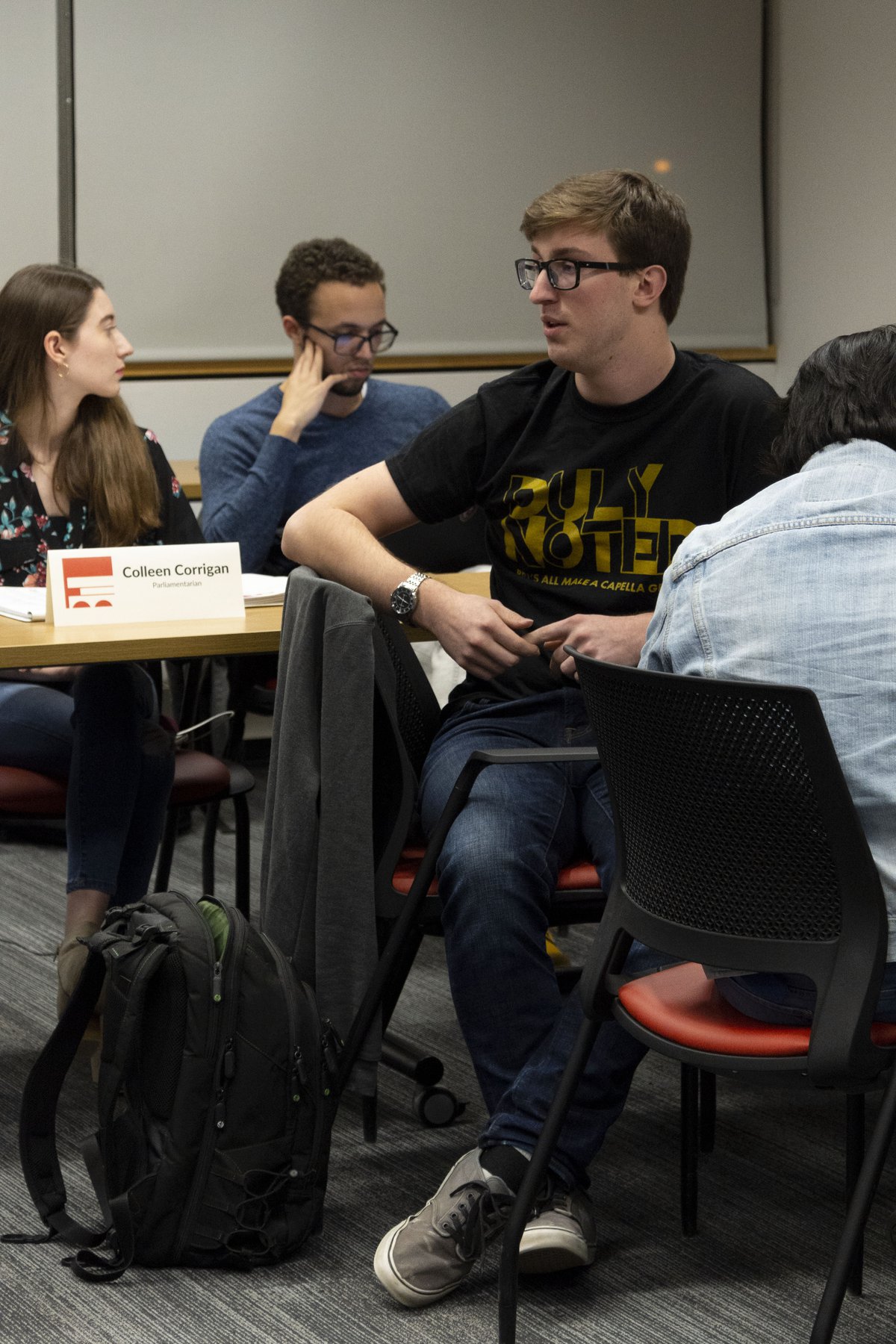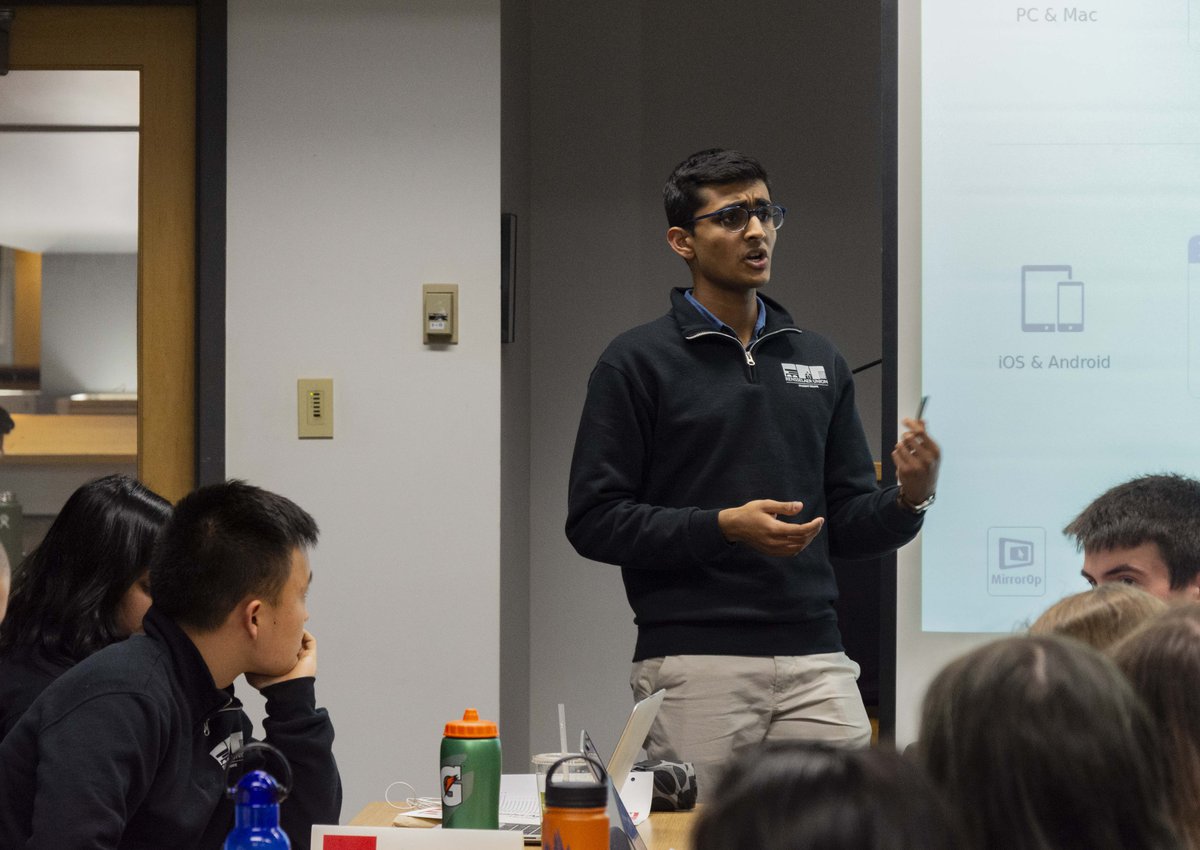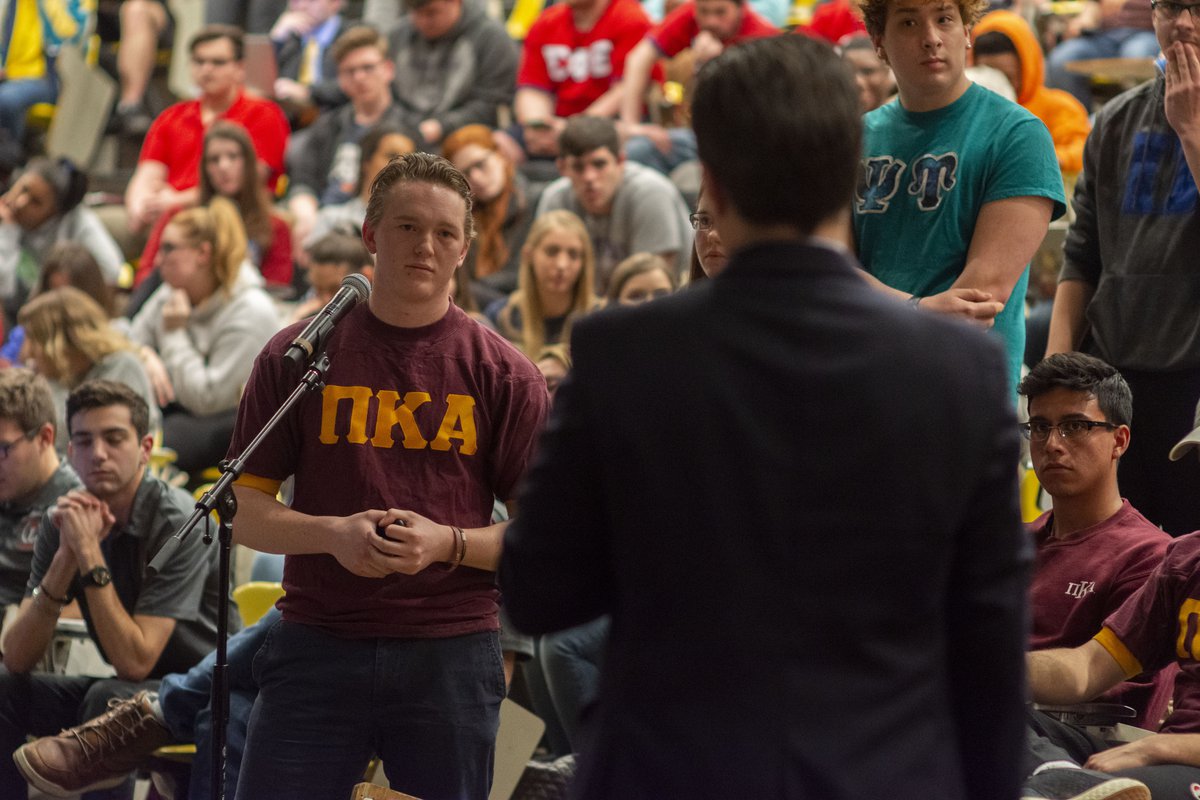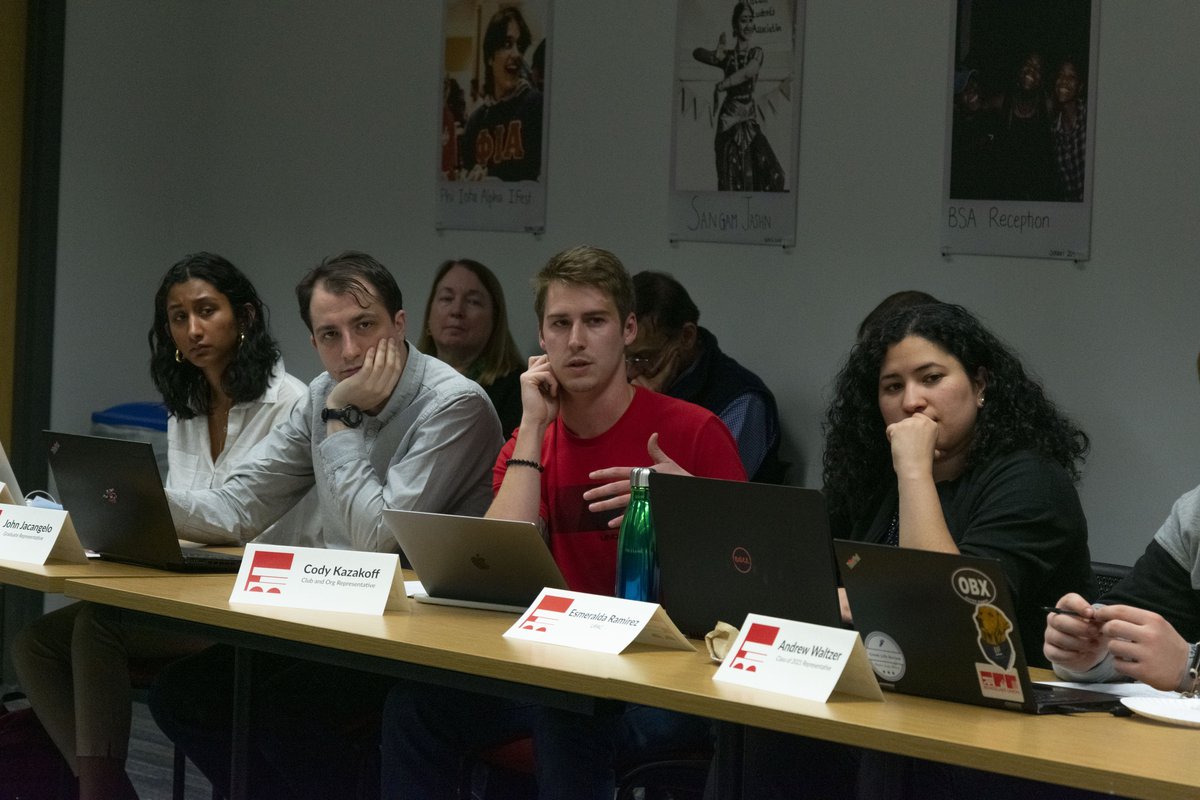Student Government Elections Policy approved

The Student Senate voted to approve the Student Government Elections Policy with changes presented by Elections Commission Chairperson Zachary Taylor ’21, heard a presentation on the ongoing “Restore SIS Man” petition, and approved multiple policy changes to the Bylaws of the Rensselaer Union Undergraduate Council on February 4.
Following extensive discussions from the previous weeks on The Elections Reform Task Force Report and a presentation given on the Rensselaer Union Voting System, the Elections Commission presented their final changes to the Student Government Elections Policy, and a motion was read to approve and enact the policy. This document outlines the procedures and rules surrounding Student Government elections, and is divided into three articles: information for candidates, information for the Elections Commission, and pre-campaigning guidelines.
Taylor began his presentation by announcing that the EC has voted to approve the use of the Rensselaer Union Voting System for the 2019 GM Week election and promised “at least one intensive trial run of the election, at the latest March 15,” which would allow one week before the election to identify and fix any issues. Later in the meeting, Web Technologies Chairperson Joseph Lyon ’20 suggested doing the trial run at least one month before the election with the intent to find “vulnerabilities.”
Taylor then moved into the explanation of changes to the policy. He stated that members of the Elections Commission are no longer permitted to run for any elected position, serve as a campaign manager for or endorse any candidate, or otherwise show “favoritism” to any candidate. Candidates must also now record and report any non-tangible, online purchases toward their election—mainly advertising through apps such as Snapchat or Facebook—in their candidate expense form. Sample ballots are now to be made available to candidates at least 48 hours before the election for “people to check over for any errors,” and the election must occur at least 24 hours after the finalized ballots are made public. Violations of these policies would result in a delay of the election. The policy also now states that any member of the EC can be removed by a two-thirds vote of its voting membership.
When the Senate moved into Q&A, Lyon asked if the policy included the changes to the number of required nominations to run for 2020 elected positions that had been discussed in previous meetings. Taylor responded that the policy will increase nominations for 2020 senator from 75 to 100 and 2020 representative positions from 30 to 40, and decrease nominations for 2020 president and vice president from 75 to 65.
Lyon urged the Senate not to approve the motion without changing these numbers to their original values, specifically in relation to the increase in senator and representative nominations. He argued that raising nomination numbers is a “short-sighted move,” and that “we do not need to make it harder to get people in the room for Student Government.” This sentiment was supported by Class of 2020 Senator Tahsin Islam.
“The reasoning behind this decision has been stated at two full Senate meetings—each presentation took at least half an hour,” responded Taylor. He argued that the discussions justified their decisions and that “this is a moderate change that I think more accurately reflects what people are able to do.” A straw poll was held to gauge the opinions of the Senate on the increase of 2020 senator and representative nominations. The results showed that six senators agreed with the increases, while nine disagreed, implying that the majority of the Senate disagreed with a portion of the policy they later voted to approve.
During the discussion on the merits of the motion to approve the Student Government Elections Policy, Lyon said that he “would like to motion to change those numbers back to what they were last year.” He then asked if “we were allowed to do that,” to which many of the people in the room shook their heads no. “No? No? Can’t change it? I would say don’t vote on this because we need to change those numbers,” Lyon responded.
There is nothing in the Bylaws of the Student Senate or Robert’s Rules of Order, which is the parliamentary authority for any procedures not specified in the bylaws, that would have prohibited Lyon from moving to strike out and insert different numbers in the Student Government Elections Policy.
In response to Lyon’s comment on not voting on the document, Taylor said that the Senate would need more evidence to reject the policy just because of these numbers. When Class of 2022 Senator Emi Ahlo asked what would happen if they voted no, Taylor said that the Commission would meet tomorrow and do research on the elections and nominations, and that this would be “a ridiculous amount of work.”
The motion to approve the Student Government Elections Policy passed 9-5-3.
Vice Grand Marshal Meagan Lettko ’20 presented to the Senate on the “Restore SIS Man” petition. “SIS man” is a small computer icon that formerly resided on the Student Information System landing page. This page also hosted links to various pages, such as lists of transfer courses and Arch courses, as well as a link to the Registrar’s website. In her presentation, Lettko reported that Grand Marshal Stef Warner ‘19 has ongoing communications with Division of the Chief Information Officer staff to restore both the links and the “SIS man” icon. She believed that the restoration was possible and would be coming soon, though there were initial challenges with the compatibility of the new site.
A motion tabled in the previous week’s meeting was brought in front of the senate again. The motion defined the ERTF’s purpose to “review elections policies, processes, and technical systems to identify and recommend solutions to any issues [with the 2018 Grand Marshal Week Elections].” It then presents a list of recommendations for both the Senate and the Elections Commission. Lyon moved to table the motion indefinitely, since the policy was already passed and most of the recommendations had been covered in the new changes; this passed 10-4-2.
The last motion read to the Senate resolved to thank the Greek Life Task Force for their presentations to the Senate and draft report to the community, as well as to “urge the Greek Life Task Force to grant an extension to the commenting period by at least two weeks so that all members of the RPI community can thoughtfully reflect on the suggestions made.” Both Lettko and Taylor adamantly explained that both unaffiliated students and Greek students need more time to read and react to the draft, especially in light of the timing of the release; many Greek organizations are currently conducting spring rush. This resolution passed 17-0-1, and the deadline for public comment was later extended by one week in an email sent to the Rensselaer community by Special Assistant to the President Le Norman J. Strong.
The Undergraduate Council also proposed two amendments to its bylaws. These included a motion to distribute any funds in the Undergraduate Council budget that were unused at the end of the fiscal year evenly among the class councils. Taylor explained that this was to prevent overspending from the Council if the excess were to rollover each year. The motion passed unanimously.
The second motion created a section in the Bylaws of the Rensselaer Union Undergraduate Council allowing the removal of any officer or representative on the UC given the council has “good cause” and passes both an impeachment vote and a removal vote. “Good cause” is defined as “two or more unexcused absences from meetings of the council,” and “failure to conscientiously fulfil their duties of office.” After President of the Union Justin Etzine ’18 G’19 pointed out that this motion would conflict with The Rensselaer Union Constitution if it included the undergraduate council president. It was amended to exclude that position. The Senate unanimously approved the motion both before and after the violation was fixed.
In an effort to clarify its own bylaws, the Senate also approved two amendments, the first of which clarified that voting members of the Senate cannot hold an “elected” position—as opposed to the previous wording of “officer” position—on the Undergraduate Council. The second clarified that quorum for the Elections Commission shall be two thirds of the total membership. Both motions passed unanimously without discussion.
Caitlin Kennedy ’19 G’21 was unanimously approved as the 2019 class representative of the Executive Board, which was simply a rearrangement of positions to allow for a vacant member-at-large spot on the Board. Approval of Etzine’s appointment of Dragana Dragutinovic ’20 to this vacant position was approved unanimously.
The Student Senate meets every Monday at 8 pm in the Shelnutt Gallery.

 Student Senate
Student Senate
 Greek Life
Greek Life
 Executive Board
Executive Board